Ten NW Buddhist Climate Action Leaders’ Paths
Written by: Iris Antman and Jordan Van Voast
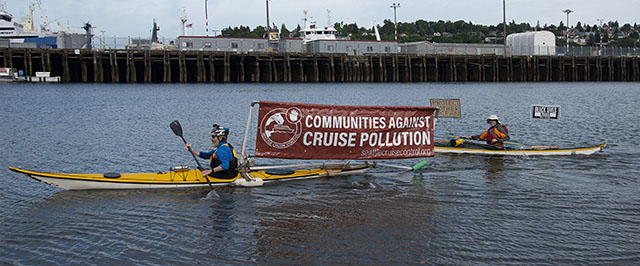
Article co-author and Buddhist Jordan Van Voast is working with others to stop a proposed Seattle cruise ship terminal, in order to reduce greenhouse gases.
Photos by: Sabina Lin ,Sharon Methvin, Lobsang Sherab, Sravasti Abbey, Jennifer Ting, University of Washington Indigenous Wellness Research Institute, Zhiwa Woodbury
Northwest Buddhists are responding creatively to the climate crisis in many ways, including art, activism, lifestyle choices and Dharma practice.
The climate crisis is huge and complex, requiring systemic and individual changes to move toward solutions. Buddhist ethics and vows impel us to strive to protect life and alleviate suffering, by doing everything we can to reverse the destruction of the planet from climate heating and environmental destruction.
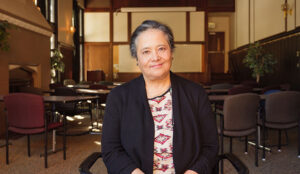
Professor and Dharma teacher Bonnie Duran serves on the board of White Swan Environmental, a Native American group.
Regional Buddhists are taking steps including going vegan, creating food security through gardening, participating in climate rallies, filmmaking, blogging, lobbying policymakers, and supporting indigenous cultural revitalization.
We heard from 10 Northwest climate change leaders who practice Buddhism, and below is what they shared. The 10 are arranged alphabetically, by last name.
Bonnie Duran is a mixed-race Opelousas/Coushatta Native American, and a member of the Spirit Rock Meditation Center Teachers Council, who understands that the climate emergency disproportionately impacts Black, indigenous, and people-of-color communities.
Duran is working to build climate resiliency in native communities through multiple projects as a public health researcher and tenured professor at the University of Washington.

A Dharma Voices for Animals bus ad campaign in Portland makes the climate change connection.
Recently she joined the board of White Swan Environmental, a collaborative effort by Coast Salish people to restore traditional native villages in the San Juan Islands, north of Seattle. By reestablishing traditional village sites, longhouses, native plants and ceremony, indigenous cultural revival awakens knowledge that can help society adapt to the accelerating changes ahead. This work can help bring global culture back into balance with the land, the water, the air, and the sun.
Duran says Buddhist meditation on the four elements is an important practice for understanding we are not separate from nature but part of it, and dependent on the balance among the elements.
Susan Godfrey has been interested in the environment and climate for many years. She is a vegan and a member of Dharma Voices for Animals, which supports animal rights.
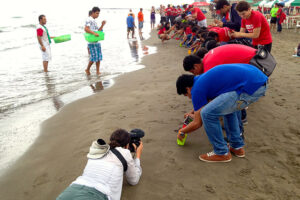
Instead of becoming a Buddhist nun, Michele Gomes now makes films about environmental peril, here on Cape Cod.
Godfrey plans to distribute to world leaders the Dalai Lama’s new book “Our Only Home: A Climate Appeal to the World,” about the need for humans to address the human-caused climate emergency. Godfrey hopes His Holiness’ preeminence on the world stage will be a potent motivator to action. She is raising funds for book purchase and distribution.
Godfrey, who lives in Seattle, also educates friends, family and others about the impacts lifestyle choices have on the planet.
Michele Gomes considered becoming a Buddhist nun.
But with her partner Jenny Ting, Gomes instead co-founded Seattle-based Interchange Media, with its mission “To put the eye of the camera on life-saving values.” Gomes calls filmmaking a “vehicle for raising awareness about the fragility and interconnectedness of life.”
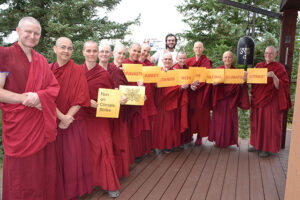
Sravasti Abbey monastics actively support climate change activism.
Making their award-winning documentary film “Saving Sea Turtles: Preventing Extinction,” exposed Gomes and Ting to the immense scope of our fossil fuel-addicted world.
“Over 30,000 drill sites dot the Gulf of Mexico. We are at a precipice. Human actions are having such an impact on the biosphere,” Gomes said. “If we destroy the planet, it becomes very difficult to practice the Dharma here.”
Jef Gunn is a member of the climate group at Kagyu Changchub Chuling, a Tibetan Buddhist Sangha in Portland. He’s also a painter who works outdoors, capturing the beauty and vulnerability of the landscape.
One of the pieces in Gunn’s recent show at Augen Gallery in Portland was of the proposed Kalama Methanol Refinery. If built the project will radically threaten the entire region’s air, water and land.
In speaking with obvious emotion about his concern for this area, Gunn quotes the “Wizard of Oz” tin man: “Now I know I have a heart because it’s breaking.”

Tzu Chi volunteer Angela Wan leads an online vegetarian cooking class.
Venerable Thubten Jampa has lived at Sravasti Abbey, a Buddhist monastery north of Spokane, since 2011. As the climate crisis accelerates the wildfire season has grown worse, sometimes forcing her to wear an N95 mask during sleep.
The abbey does not separate the social from the spiritual. While Abbess Venerable Thubten Chodron always emphasizes reducing the three poisons of greed, hatred and ignorance for inner growth, Ven. Jampa says the abbey strives to not live in a spiritual bubble. For instance monastics are reducing energy consumption and using environmentally beneficial building materials, as the abbey expands to accommodate more visitors.
Recently the monastics participated in a climate strike rally. Venerable Jampa has spoken at climate justice events in Spokane.
Angela Wan leads an online vegetarian cooking class at the Bellevue office of global organization Tzu Chi USA, which means “compassion relief” in Mandarin Chinese. Founder Master Cheng Yen frequently emphasizes collective karma, saying that when humans broadly harm nature, by cutting down forests and killing sentient beings for food, human suffering via climate disasters is a consequence.
As one response Tzu Chi has launched a vegetable garden, for fundraising and for education.
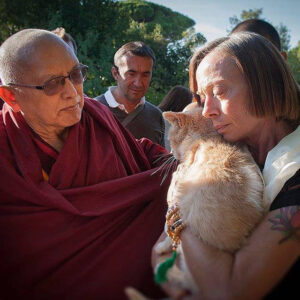
Sharon Methvin, a Buddhist activist supporting animals’ rights, with Lama Zopa Rinpoche.
Dr. Sharon Methvin, a semi-retired professor of anthropology and a vegan for 32 years, was brought to Buddhism and Lama Zopa Rinpoche’s teachings on compassion through awareness of animals’ suffering.
Four years ago she founded the Portland chapter of Dharma Voices for Animals (DVA), an international Buddhist organization focused on animal suffering. Last summer Portland DVA launched a bus ad campaign, encouraging people to go vegan by connecting meat eating and the climate.
Nonetheless she acknowledges that people only embrace change when the issues affect them in a deep personal way. Methvin gave up her car and sold her house in the countryside 10 years ago, “trading personal space (and a much-larger carbon footprint) for community space.”
Dr. Jason Wirth, a philosophy professor at Seattle University and a Zen Buddhist teacher, offered a koan about the 11 September days when Seattle’s air quality was among the worst in the world: “We were breathing who we are.”
“Thinking of how the climate emergency affects one personally is a question that highlights the cause of our dilemma,” he said, adding that to do otherwise is “Not understanding the truth of interconnection.”
Wirth co-directs a Dharma group called EcoSangha, focused on what he calls “Buddhist ecology.” EcoSangha members also support movements such as Black Lives Matter, and indigenous rights groups, by attending rallies and marches whenever and wherever they can.
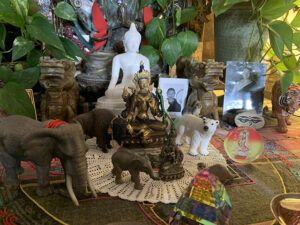
Statues of endangered species share Zhiwa Woodbury’s altar with Buddhist masters.
Zhiwa Woodbury first became aware of the fragility of our planet’s ecosystem and the climate emergency during the 1980s. After defending wildlife habitat from the U.S. Forest Service and the logging industry as an attorney, he realized he needed to better understand climate science to skillfully respond to the unfolding planetary crisis. This led him to earn a degree in East/West psychology.
Woodbury’s work with environmental activist and Buddhist Joanna Macy led him to author ground-breaking articles in the emerging field of climate psychology. His Buddhist practice has helped him realize that a core flaw of Western culture and science is believing in a self separate from nature. Woodbury shed his car years ago, is a vegan, lives north of Seattle, and visits mountains and forests whenever possible.
Ken Yasuhara, a member of the Climate Action Group at Seattle Insight Meditation Society, has evolved from personal lifestyle choices including owning no car, eating a plant-based diet, rarely buying anything new and minimizing travel, to speaking out publicly. This includes educating friends, supporting state legislation with emails and phone calls, and marching with his climate group.
It is the nature of Buddhist practice to turn toward the nature of reality, including uncertainty about the future. By understanding our profound interconnection, and cultivating compassion for ourselves and every living being, and the planet, we learn to act wisely individually and collectively.
Iris Antman serves on the board of Seattle Insight Meditation Society and is a member of its Climate Action Group. She works to address the climate emergency with a variety of climate groups, and finds deep solace and support from engaging in these efforts with others. “Whatever the future holds,” she said. “It is clear to me we have a choice and a responsibility, in every moment, about how we live and respond to this crisis.”
Jordan Van Voast engages in disaster relief work as an acupuncturist, and serves on the board of Dharma Friendship Foundation. As an activist he currently is working with Seattle Cruise Control, a group focused on stopping cruise ship expansion in the Salish Sea. A vegan, he is a year-round gardener and enjoys walking meditation in the wilderness.
